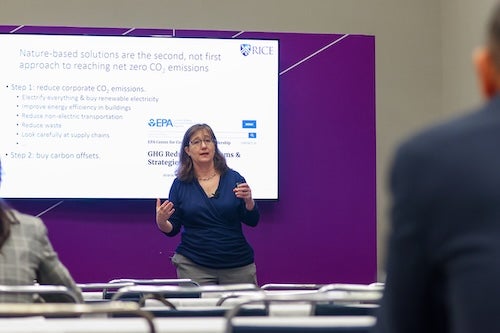Rice University biogeochemist Carrie Masiello was a headliner in CERAWeek’s “lyceum” where experts from industry and academia present research and technical expertise at the annual energy conference in Houston.
The first step in addressing the atmosphere’s carbon dioxide burden is to reduce emissions, Masiello said, noting that all current scenarios that stabilize our climate also require removal of atmospheric CO2, and nature-based solutions are currently the least expensive approach to do this. The last two years have seen dramatic growth in the number of startups touting new approaches to atmospheric CO₂ removal, she said. Her talk explored the breadth of possible nature-based solutions and how industry can match solutions to their portfolio needs.

Reforestation (or avoided deforestation), no-till agriculture, adaptive multipaddock grazing and biochar are examples of nature-based solutions that can mitigate climate change, improve water and urban air quality, recover wastewater, reduce flooding, stabilize shorelines and cool cities.
“The idea with biochar is that instead of allowing that grass to decompose back to CO₂ in six weeks, you would convert it to charcoal, which has an environmental residence time between 1,000-10,000 years,” said Masiello, the W. Maurice Ewing Professor of Biogeochemistry and professor of Earth, environmental and planetary sciences, chemistry and biosciences. “About half of the carbon dioxide is lost immediately to the atmosphere during the conversion, and then about half remains as charcoal. When charcoal is intentionally made for the purposes of adding it to soil, we call it biochar, and biochar has really great co-benefits. It’s absolutely fabulous at holding on to ammonium and nitrate, and so what that means is that farmers can use less fertilizer.”
Masiello is also an adviser for BCarbon, a carbon registry that came out of Rice, and director of the Rice Sustainability Institute, which develops energy and environmental solutions that are economically positive, socially viable and globally relevant.
Led by Masiello and executive director Marie-Nathalie Contou-Carrere, the institute’s strategy is to link science and technology, economics and policy and social sciences and the arts to affect real change. Through partnerships across academic, industry and community sectors, the institute drives innovations that tackle current sustainability needs while preparing resilient, responsible leaders for the future. The institute operates on the belief that science and technology generate innovative solutions, economic and policy work crafts functional solutions, while social and cultural knowledge finds solutions that work for all communities.
The institute also supports all sustainability scholarship on campus, complementing Rice’s existing strengths in the areas of coastal, carbon and sustainable energy futures.

